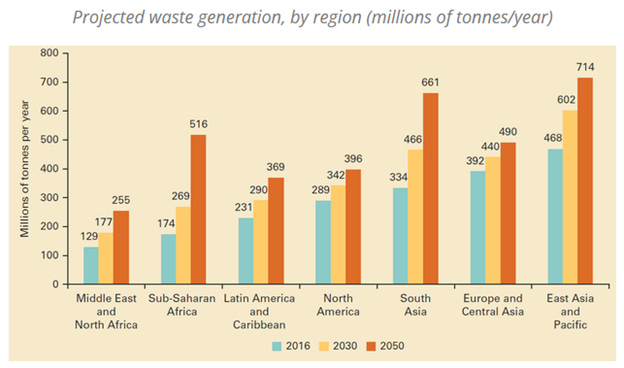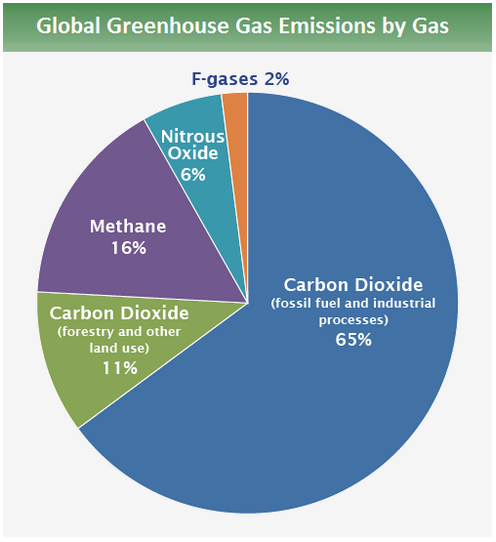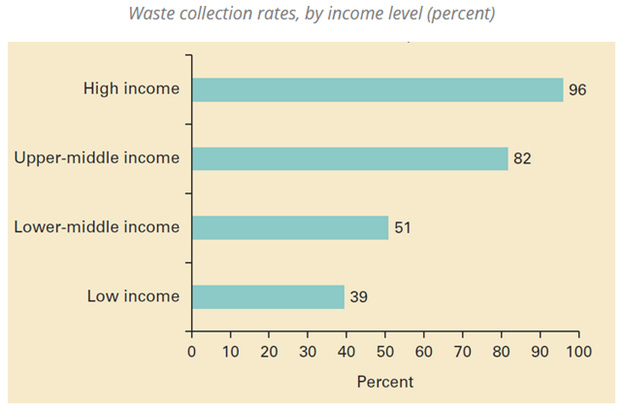From Evergreen Investing: June 2023
Meaningful progress towards net zero must include how we deal with waste and recycling as an integral part of the narrative.
The old adage that “one man’s trash is another man’s treasure” is becoming more relevant than ever. That’s because, thankfully, we are increasingly finding ways to recycle, reuse and repurpose through innovation and technology, and to manage the waste we still produce in ways that minimize its impact.
Still, there remains plenty of room for improvement.
According to The World Bank, we now generate 2.01 billion tonnes of municipal solid waste every year on a global scale. As much as one third of that is not managed in an environmentally friendly way. Despite only representing 16% of the world population, developed countries are responsible for about 34% of total waste.
As global living standards improve, consumption rises along with them. That means worldwide waste is forecast to reach 3.4 billion tonnes by 2050, more than doubling the pace of population growth.
That is an issue as we run out of places to store waste. The pollution and greenhouse gas emissions (GHG) created are equally concerning.
On average every human produces 0.74 kg of waste each day. Our refuse generates a number of by-products, one of the worst being methane. It’s more powerful than CO2 in terms of climate impact and it accounts for up to 16% of greenhouse gas emissions (GHG). According to the International Energy Agency (IEA), methane is to blame for some 30% of the increase in world temperatures since the start of the industrial revolution.
As humans, how we deal with these issues is going to dramatically impact our quality of life for decades to come. Properly managing waste and recycling will help shape a cleaner environment and a healthier outlook.
And yet some highly impactful actions are well within reach.
A report from the Global Alliance for Incinerator Alternatives (GAIA) suggests reducing waste by segregation, composting, and recycling could help lessen the global waste sector’s overall emissions by as much as 84%. That’s the same as removing every vehicle from the road in the US for 12 months!
According to GAIA, some 550 cities worldwide are implementing zero-waste policies, with impressive results. Eight cities modelled have achieved an 84% average GHG reduction.
This is the kind of mandate that more and more cities will adopt in the coming years. And waste management companies will be the beneficiaries.
Waste management is the collecting, transporting, and disposing of garbage, sewage, and other waste materials. That includes solid, liquid, and even gas products, each of which can originate from municipal, industrial, and hazardous sources. It also includes technologies that use waste to create energy, bringing the consumption loop into full circle. This is what we call energy from waste.
As countries develop, so do their approaches. Today almost 70% of nations regulate waste management in one form or another. Government entities handle about half of treatment and disposal services; about one third of these include a public-private collaboration.
The range of regulatory stringency is very wide, from primitive landfill everything to mandated and monitored segregation of garbage, recycling, and green waste. Over time, governments are getting more stringent via new policies to reduce illegal dumping, drive greenhouse gas reduction, and minimize landfill growth.
This is the core of this investment opportunity today: government policy is requiring ever better waste management, which is fueling growth for established providers in the space. Mandate-powered growth can create tremendous opportunity for investors, especially when barriers limit the number of established providers.
Overall, the larger investable opportunity exists in the more developed areas like Europe and North America, where at least 90% of waste is collected.
The World Bank tells us that about 37% of global waste ends up in landfill, but only 8% of landfills are considered sanitary with gas collection systems. Proper disposal, like controlled landfills and more rigorous facilities, are nearly exclusive to more affluent nations, where 39% of waste finds its way into landfills, 36% is recycled and composted, and another 22% is incinerated.
Those ratios are much better than in developing nations but they still leave a lot of room for improvement. Do you know anyone who works in a hospital? Ask about recycling there and the answer is probably “nope!” because it’s hard amidst patient needs, biowaste considerations, and cost. But whatever the challenges, “nope” will not last: waste management change will be forced upon everyone and everywhere over the next decade via government mandates trying to ensure what’s disposed gets sent to the right place.
Mandates require companies provide. And here’s where things get interesting for investors. Waste management is a big market that’s growing quickly. According to Grand View Research, this sector was estimated to be worth $1.3 trillion in 2022 and is forecast to rise at a breakneck compound annual growth rate (CAGR) of 5.4% through 2030 to reach $2 trillion.
That’s a lot of money set to pour into this sector. The time to position yourself to leverage this phenomenal growth is now. And we have the ideal vehicle for that.
This content is available thanks to subscriber support.
To subscribe to the full newsletter, subscribe to Evergreen Investing here.



